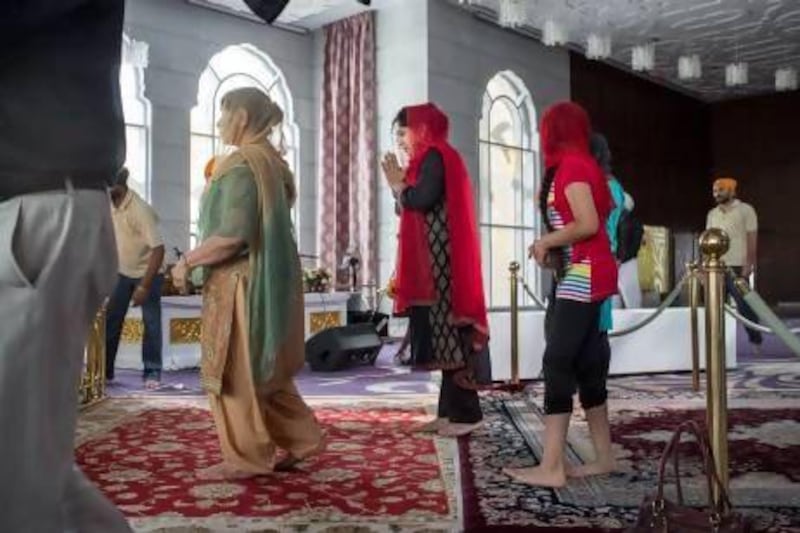DUBAI // A sandstone-coloured Sikh temple in Jebel Ali has become the latest symbol of religious tolerance in the UAE.
People file in under small domes and arches trimmed with lattice work. They remove their shoes and cover their hair as the chants of kirtans and prayers fill the region's only gurdwara (temple).
Apart from being a place of worship for Sikhs, it is also a must-see for many Asian tourists.
"When visitors land they immediately want to come to the gurdwara," said Baljinder Kaur, an IT consultant and mother of two who takes visiting friends and family from the UK, Bahrain and Qatar to the temple.
"They want to start their journey by bowing their heads here. Even taxi drivers bring people. They ask, 'have you seen this place?' It has become a monument of sorts."
Seth Alves, a tourist from Kenya, was among several hundred people entering the gurdwara this week to sit cross-legged in a hall filled with worshippers listening to devotional songs.
"I was in the textile souq on a tour when I heard about this place," he said. "I was amazed that there is one in the UAE so I had to come and see for myself.
"I always found a sense of peace when at a gurdwara with my Sikh friends in Kenya and I know all religions are welcome."
Ajit Singh, who sings kirtans or devotional songs at community functions, fields many queries from tourists.
"They spot my turban and ask me questions," Mr Singh said. "They ask me for the best time to visit and how big it is."
Before the gurdwara opened last year, the 50,000-strong Sikh community prayed at a shrine inside a Hindu temple complex in Bur Dubai. It was built in 1958 and there are also more than 22 churches spread across the seven emirates.
The newest Catholic church opened in Ras Al Khaimah last month.
Even Mormons have a place to gather in Abu Dhabi after the Abu Dhabi Stake Centre opening in Mussaffah in February.
"It is just a marvellous feeling to have a church close to home," said Mathew Santosh, who was among more than 8,000 worshippers who attended the first mass at RAK's new Catholic church on June 14.
"People would travel to the Sharjah church to pray and now they can all come here.
"There are 35 different nationalities who come here - we have crowds from the Philippines, India, Africa, Sri Lanka and Europe."
Mr Santosh said that people outside the UAE often did not know about the freedom afforded to follow different religions here.
"People are surprised that a Muslim country has so much freedom," said Mr Santosh, an electrical contractor who has lived in RAK for 15 years.
"It is news for people outside that we can worship. I too thought it would be a desert with nothing here when I first came but I find people are sometimes more religious here than back home because they need a sense of community and are far away from family."
Celebrating different religious occasions adds to a sense of fraternity.
"It's not just Eid for which we all come together, but we celebrate many festivals," said Aziz Abdullah, a Sharjah businessman.
"We sit together, enjoy each other's company and there is unity in all our hearts."
Observing different last rites for the dead is equally important to many residents, which is why Sharjah opened a crematorium in February - the country's fourth.
"Some families have lived here for 50 years. This is home to them, so it's very important for them to be cremated here," said Prabhdeep Singh, a chartered accountant.
"All their relatives are in the Emirates and so they want their last rites performed here rather than taking the body back home to India.
"Practicing your religion to the end makes a big difference to people's lives and gives them a sense of peace."







